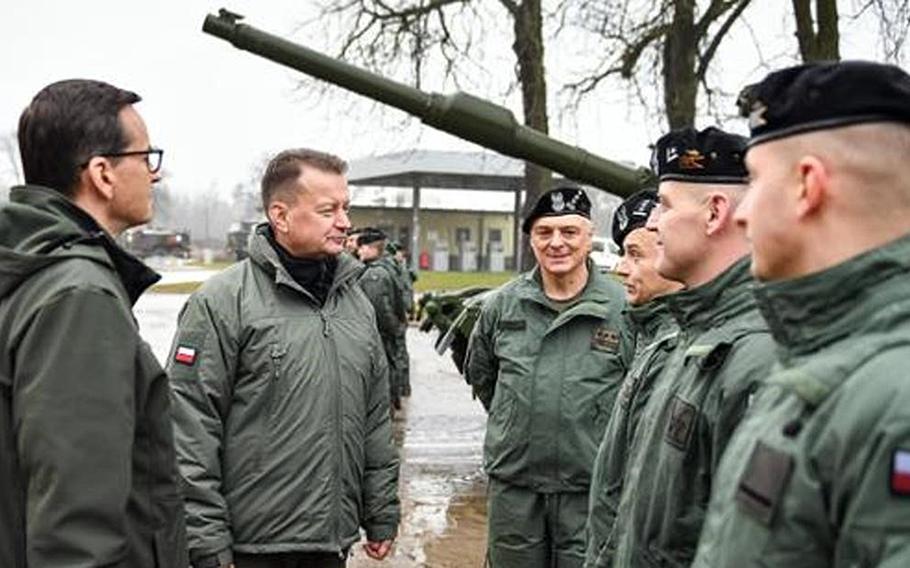Europe
Poland seeks to mend Ukraine rift with arms supplies U-turn
Bloomberg September 21, 2023

Polish Prime Minister Mateusz Morawiecki, left, and Defense Minister Mariusz Blaszczak meet with crews training on Abrams tanks in Biedrusko, Poland, in 2022. (Polish Defense Ministry)
The Polish government sought to walk back remarks by its premier that the country had stopped weapons shipments to Ukraine, tapping the brakes on an escalating dispute that’s shaken a key wartime alliance.
After Prime Minister Mateusz Morawiecki said Poland is no longer transferring weapons to Ukraine, his office aimed to lower the temperature following a heated exchange of barbs this week that has dismayed allies and undermined a relationship has been crucial to aid to Kyiv.
“Poland is only carrying out previously agreed supplies of ammunition and armaments, including those resulting from the contracts signed with Ukraine,” government spokesman Piotr Muller said. Those include a contract to deliver locally-manufactured howitzers, he added. “Poland consistently helped repel Russia’s attack.”
The sparring marked a sharp contrast to the unity on display between the two allies since Russia’s invasion last year, with Poland a key conduit of weapons and aid to Ukraine. But the comity reached its limit after Warsaw extended a unilateral ban on grain imports to appease restive farmers, an important constituency for the ruling party ahead of a tightly contested election on Oct. 15.
The prime minister’s statement on weapons to Ukraine was misunderstood and wrongly interpreted, a government official said on condition of anonymity. Another official said Poland has no more weaponry that can be donated, but ammunition shipments will continue.
The spiraling war of words between Warsaw and Kyiv has alarmed governments committed to supporting Ukraine.
Lithuanian Defense Minister Arvydas Anusauskas told reporters that cutting off aid to Kyiv wasn’t on the table in talks with his Polish counterpart the day before.
On the contrary, “we discussed aid to Ukraine, the Ramstein format, coalitions, supplies — that is, the complete opposite things,” Anusauskas said.
An easing also appeared to be possible on the grain front a day after Morawiecki threatened to expand import restrictions to other Ukrainian products. The two countries’ agriculture ministers agreed in a phone call to seek a solution.
Still, in addition to comments by President Andrzej Duda aimed at Ukraine’s Volodymyr Zelenskyy in the last 48 hours, the remarks marked a dramatic change of tone from Polish leadership.
European capitals were caught off guard by the volume of the dispute — and are hoping to see the spat fade quickly, according to an official familiar with the discussions. Another official, who spoke on the condition of anonymity, voiced concern that protracted tension with Poland will give other donors an opening to scale back support because of war fatigue.
In the months following the start of Russia’s invasion, Poland lambasted other Western countries, especially Germany, for being slow in delivering arms to Ukraine.
It became one of Kyiv’s biggest donors and the first nation to deliver high-end Leopard tanks in February as well as Soviet-era jets and ammunition.
Zelenskyy travels to Washington on Thursday, where he’ll press President Joe Biden for sustained support to counter Russia’s war machine — with allies fearing that the conflict will drag on for years — just as hard line Republicans are threatening to halt additional aid.
The Polish-Ukrainian standoff cast sudden doubt on the unity that had defined the neighbors’ relationship before the grain dispute, a friendship that seemed to epitomize European solidarity with Ukraine against the Russian invasion.
Poland is the primary destination for refugees and the gateway to about 90% of all the western aid and military equipment headed for Kyiv.
“Tension and disagreements between Kyiv and some of its strongest backers is sure to instill more confidence in the Kremlin that European support for Ukraine is not certain over the long term,” said Peter Schroeder, a former Russia analyst at the U.S. Central Intelligence Agency and now an adjunct senior fellow at the Center for a New American Security.
The stakes were as clear as ever as the war headed into its 19th month. Russia launched the largest missile barrage to target the Ukrainian power grid since early spring just as Zelenskyy enlisted help in the U.S.
For Poland, the issue is a political one. The ruling Law & Justice party is seeking a third term in office in next month’s contest, as polls show that it may struggle to secure a majority even as it leads. One poll Thursday showed the country’s pro-European opposition parties may win enough seats in the next parliament to form a government.
Bloomberg’s Milda Seputyte, Andra Timu, Ott Tammik and Alberto Nardelli contributed to this report.